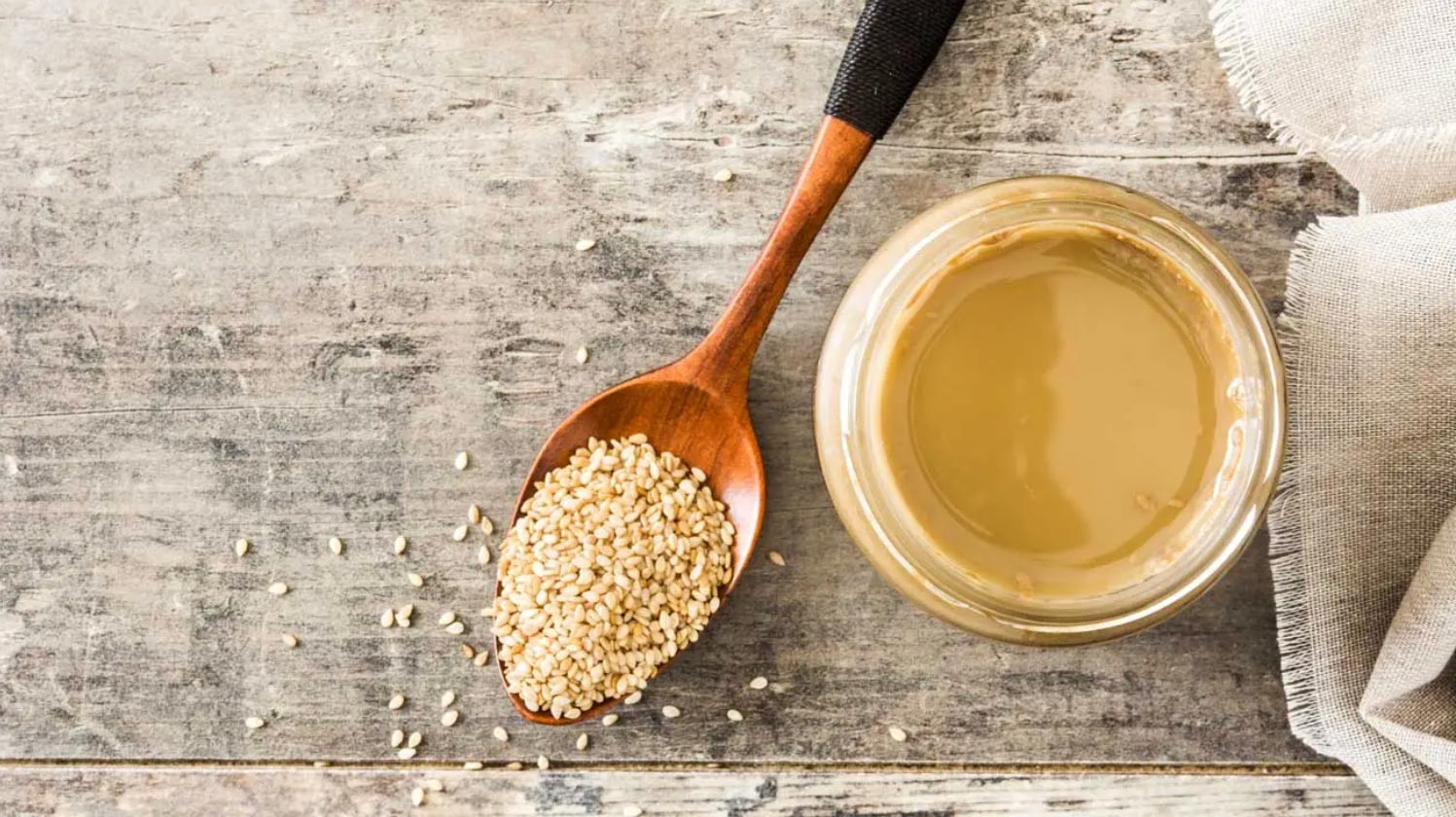It’s best known as an ingredient in hummus but widely used in many dishes around the world, particularly in Mediterranean and Asian cuisine.
Aside from its culinary uses, tahini offers several health benefits.
Here are 9 health benefits of tahini.

1. Highly nutritious
One tablespoon (15 grams) of tahini contains the following:
• Calories: 90 calories
• Protein: 3 grams
• Fat: 8 grams
• Carbs: 3 grams
• Fiber: 1 gram
• Thiamine: 13% of the DV
• Vitamin B6: 11% of the DV
• Phosphorus: 11% of the DV
• Manganese: 11% of the DV
Tahini is a great source of phosphorus and manganese, both of which play vital roles in bone health. It’s also high in thiamine (vitamin B1) and vitamin B6, which are important for energy production.
Additionally, about 50% of the fat in tahini comes from monounsaturated fatty acids. These have anti-inflammatory properties and have been linked to a decreased risk of chronic disease.
Summary
2. Rich in antioxidants
Free radicals are unstable compounds. When present in high levels in your body, they can damage tissues and contribute to the development of diseases, such as type 2 diabetes, heart disease, and some cancers.
Tahini is particularly high in the lignan sesamin, a compound that has shown promising antioxidant potential in some test-tube and animal studies. For example, it may decrease your risk of cancer and protect your liver from free radical damage.
However, more research in humans is needed to fully understand these effects.
Summary
3. May decrease your risk of certain diseases
One study in 50 people with knee osteoarthritis found that those who consumed 3 tablespoons (40 grams) of sesame seeds daily had significantly reduced cholesterol levels, compared with a placebo group.
Another 6-week study in 41 people with type 2 diabetes found that those who replaced part of their breakfast with 2 tablespoons (28 grams) of tahini had significantly lower triglyceride levels, compared with a control group.
In addition, diets rich in monounsaturated fats have been linked to a decreased risk of developing type 2 diabetes.
Summary
4. May have antibacterial properties
In fact, in some Central European and Middle Eastern countries, sesame oil is used as a home remedy for foot wounds associated with diabetes.
In one study on the antibacterial capacity of sesame seed extract, researchers found that it was effective against 77% of the drug-resistant bacterial samples tested.
Furthermore, one study in rats observed that sesame oil helped heal wounds. Researchers attributed this to the fats and antioxidants in the oil.
However, this is a developing area of research, and more human studies are needed.
Summary
5. Contains anti-inflammatory compounds
Although short-term inflammation is a healthy and normal response to injury, chronic inflammation can damage your health.
Animal studies have discovered that sesamin and other sesame seed antioxidants may ease inflammation and pain related to injury, lung disease, and rheumatoid arthritis.
Sesamin has also been studied in animals as a potential treatment for asthma, a condition characterized by airway inflammation.
It’s important to remember that most of this research has been conducted in animals using concentrated sesame seed antioxidants — not tahini itself.
Tahini contains these powerful antioxidants, but in much smaller amounts. In addition, more research is needed to fully understand how sesame seeds affect inflammation in humans.
Summary
6. May strengthen your central nervous system
In test-tube studies, sesame seed components have been shown to protect human brain and nerve cells from free radical damage.
Sesame seed antioxidants can cross the blood-brain barrier, meaning they can leave your bloodstream and directly affect your brain and central nervous system.
One animal study suggests that sesame antioxidants may also help prevent the formation of beta amyloid plaques in the brain, which is characteristic of Alzheimer’s disease.
Additionally, a rat study found that sesame seed antioxidants mitigate the harmful effects of aluminum toxicity in the brain.
However, this is early research on isolated sesame seed antioxidants — not whole sesame seeds or tahini. More research in humans is needed before conclusions can be made.
Summary
7. May offer anticancer effects
Some test-tube studies have shown that sesame seed antioxidants promote the death of colon, lung, liver, and breast cancer cells.
Sesamin and sesamol — the two major antioxidants in sesame seeds — have been studied extensively for their anticancer potential.
They both may promote the death of cancer cells and slow the rate of tumor growth. In addition, they are thought to protect your body from free radical damage, which may decrease your risk of cancer.
Although the existing test-tube and animal research is promising, more studies in humans are needed.
Summary
8. Helps protect liver and kidney function
One study in 46 people with type 2 diabetes found that those who consumed sesame oil for 90 days had improved kidney and liver function, compared with a control group.
In addition, a test-tube study observed that sesame seed extract protected rat liver cells from a toxic metal called vanadium.
What’s more, a rodent study found that sesame seed consumption promoted better liver function. It increased fat burning and decreased fat production in the liver, thereby potentially decreasing the risk of fatty liver disease.
While tahini provides some of these beneficial compounds, it contains smaller amounts than those found in the sesame seed extracts and oils used in these studies.
Summary
9. Easy to add to your diet
It’s well known as an ingredient in hummus, but it also makes an excellent stand-alone spread or dip for pita bread, meat, and vegetables. You can also add it to dips, salad dressings, and baked goods.
How to make tahini
Ingredients
Making tahini is simple. You only need the following ingredients:
• 2 cups (284 grams) of hulled sesame seeds
• 1–2 tablespoons of a mild-tasting oil, such as avocado or olive oil
Directions
• In a large, dry saucepan, toast the sesame seeds over medium heat until they are golden and fragrant. Remove from heat and let cool.
• In a food processor, grind the sesame seeds. Slowly drizzle in oil until the paste reaches the consistency you desire.
Recommendations vary for how long you can keep fresh tahini, but most websites claim it can be safely stored in the refrigerator for up to a month. The natural oils in it may separate during storage, but this can be easily fixed by stirring the tahini before using it.
Raw tahini is also an option. To make it, omit the first step of the recipe. However, some research indicates that toasting sesame seeds increases their nutritional benefits.
Summary
The bottom line
Tahini is a tasty way to add powerful antioxidants and healthy fats to your diet, as well as several vitamins and minerals.
It has antioxidant and anti-inflammatory properties, and its health benefits may include reducing risk factors for heart disease and protecting brain health.
It’s also very easy to make at home using only two ingredients.
Overall, tahini is a simple, healthy, and flavorful addition to your diet.





